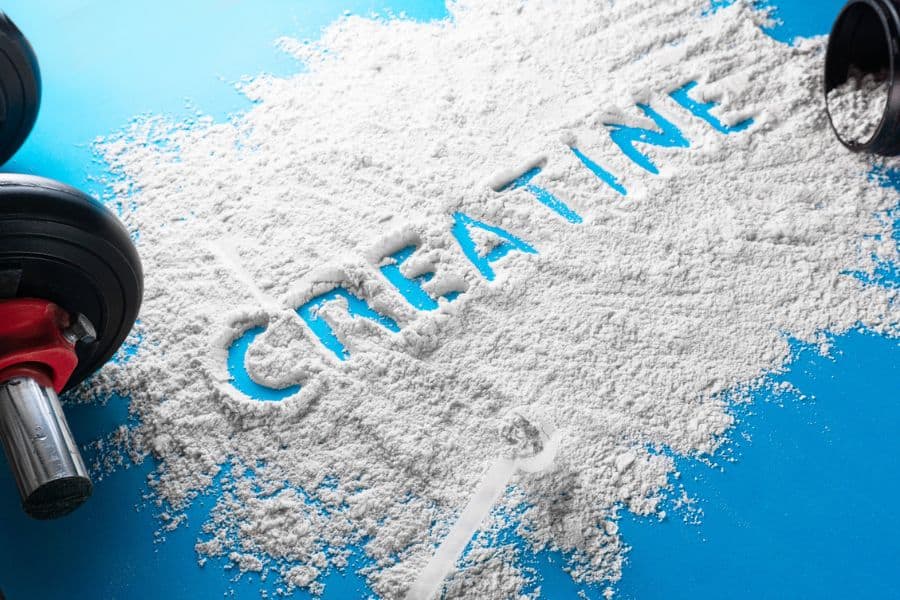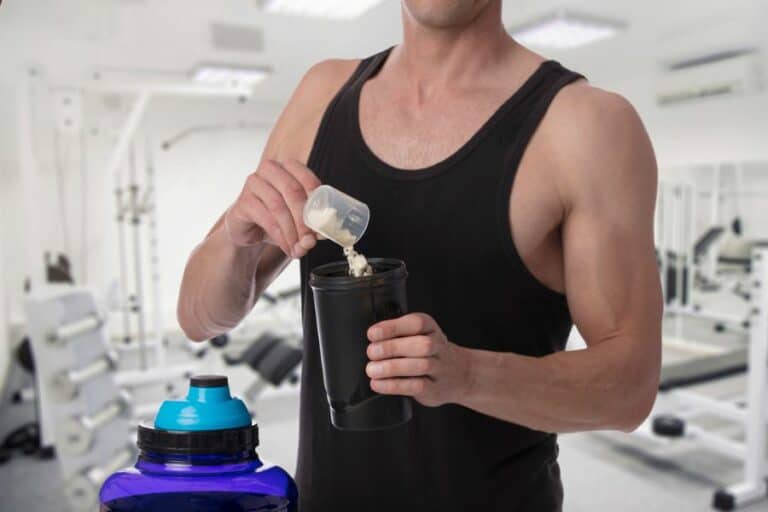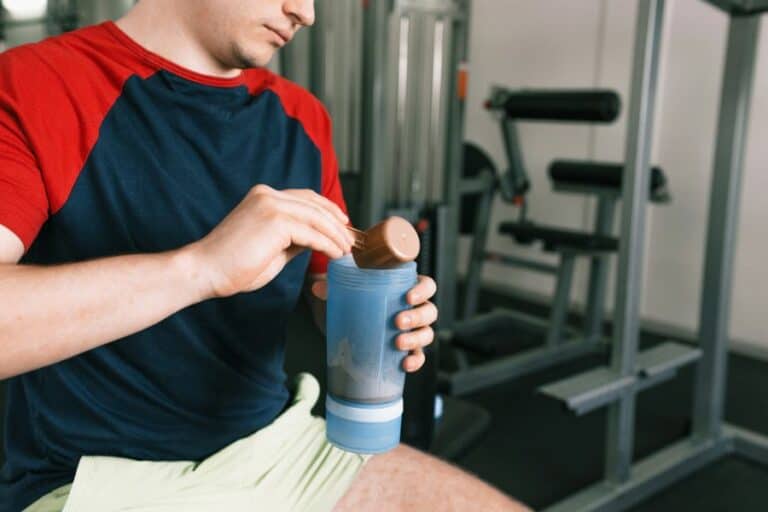Does Creatine Make You Pee More?

Does creatine make you pee more | Reasons | Remedies against frequent urination | Creatine Makes You Pee At Night | Other Associated Risks | Reduce the side effects
Creatine has been a popular supplement among athletes and bodybuilders seeking to enhance their physical performance. Known for its ability to increase muscle mass and strength, creatine has gained significant attention in the fitness world.
However, alongside its positive effects, some individuals have raised concerns about its potential side effects, one of which is an increased frequency of urination. This has led to the question: Does creatine make you pee more?
Does creatine make you pee more?
Yes, creatine may make you pee more if taken in excess or if you have any pre-existing health conditions like kidney health issue [1]MedlinePlus: Creatine.
Our body naturally produces around 1 gram [2]MayoClinic: Creatine of creatine per day.
The synthesis of this creatine requires three specific amino acids [3]National Library Of Medicine: Creatine synthesis: hepatic metabolism of guanidinoacetate and creatine in the rat in vitro and in vivo.
The kidneys are primarily responsible for this process, with additional production occurring in the liver and pancreas.
On the other hand, when creatine is consumed as a supplement, it is taken up by muscle cells and draws water into the muscles, leading to an increase in total body water content.
Once ingested, creatine is converted into creatinine—a breakdown product of creatine phosphate stored in the body that the kidneys filter out.
Roughly 95% of the internally synthesized creatine is stored in the muscles and brain as phosphocreatine with the help of creatine kinase. The remaining 5% is eliminated as waste called creatinine through urine, leading to claims of increased urination due to creatine intake.
Why does creatine make you pee a lot?
This popular dietary supplement, known for its health and performance benefits, is often associated with increased urination.
Here are the reasons why creatine intake could make you pee more.
1. Breaking down of creatine to creatinine
Creatine is a naturally occurring compound found in muscles and is involved in energy metabolism. During normal metabolic processes, creatine undergoes conversion to creatinine [4]Kidney.org: Creatinine, a waste product.
Creatinine is filtered out of the blood by the kidneys and excreted in urine. As the concentration of creatinine increases, it signals the body to increase urine production to eliminate waste.
This process helps maintain the body’s balance of creatinine levels. Therefore, when creatine breaks down into creatinine, it stimulates the kidneys to excrete more urine, resulting in increased urination.
2. Increased water intake
When ingesting creatine, it is important to increase your water intake to avoid dehydration. This aids in the absorption and effectiveness of creatine.
An indirect result of this increased hydration is more frequent urination. The excess water in your body is converted into urine, along with waste products. Consequently, you may experience more frequent urination, but this is not a cause for concern.
3. Heavy dosage
Taking too much creatine can lead to higher levels of creatinine in your body. This excess creatinine puts a greater strain on the kidneys as they work to filter it out. As a result, the kidneys produce more urine to help eliminate the excess creatinine and maintain proper balance within the body.
4. Drinking more water mid-workout
During a workout, your body experiences increased exertion and perspiration, leading to fluid loss. Replenishing lost fluids is crucial to maintain proper hydration levels.
Drinking water mid-workout helps rehydrate your body and replace the fluids that were lost. However, this can lead to pressure on bladder muscles while working out, resulting in an urge to pee more.
5. Longer loading phase
During the loading phase of creatine supplementation, which typically lasts around one week, individuals take higher doses of creatine to saturate their muscle stores more quickly.
This loading phase aims to increase the concentration of creatine in the muscles rapidly. The standard loading protocol involves consuming around 20 grams of creatine per day, divided into multiple doses.
Regardless of the timeline for the loading phase, some people take it for extended periods and in heavy doses. This can lead to dehydration and an urge to drink more water. As a result, they end up peeing more frequently.
What should you do to get rid of frequent urination with creatine?
If you are experiencing frequent urination as a result of taking creatine, there are several remedies you can try to alleviate this symptom. Here are some suggestions that may help:
1. Get your blood test or urine test
Getting lab tests while on creatine supplementation is important to monitor your kidney function and ensure there are no adverse effects. Creatine (monohydrate) may put a strain on the kidneys [5]National Library Of Medicine: The effects of the recommended dose of creatine monohydrate on kidney function, especially if taken in high doses or for extended periods.
Regular blood test and urine test allow for early detection of any potential issues and adjustments to the supplementation plan if necessary.
2. Limit your protein intake
Limiting the intake of protein-rich foods may be helpful in reducing the production of urea, a waste product that can increase urine output. However, it’s important to maintain a balanced diet and ensure you’re still getting adequate protein for your body’s needs.
It is recommended to consult with a registered dietitian or healthcare professional for personalized dietary advice.
3. Eat more dietary fiber
While the evidence here is limited, some research has found that consuming enough dietary fiber may help to reduce the body’s creatinine levels.
In any case, dietary fiber is known to reduce dehydration (which causes frequent water consumption) and prevent constipation which tends to put pressure on the bladder (that may lead to frequent urges to pee).
Including fruits, vegetables, whole grains, and legumes in your diet can therefore be beneficial if you are on creatine supplementation.
4. Reduce your salt intake
Reducing salt intake may help manage fluid retention and decrease the volume of urine. Excessive salt consumption can lead to water retention, which can increase urine production.
It’s advisable to limit processed and packaged foods that are typically high in sodium and opt for fresh, whole foods.
5. Limit caffeine and alcohol
Caffeine and alcohol can act as diuretics, stimulating urine production and increasing the frequency of urination.
Reduce your consumption of these substances while on a creatine supplementation routine, especially in the evening, to minimize your bathroom trips and, eventually, disruptions to your sleep.
Does Creatine Make You Pee At Night?
There is no direct evidence to suggest that creatine supplementation causes nocturia (frequent urination at night).
Creatine is known to increase the body’s creatinine levels, potentially increasing overall urine production. However, individual responses may vary.
It is more likely that increased fluid intake and consumption of supplements and foods rich in caffeine or nitric oxide boosters before bed may contribute to nighttime urination rather than creatine alone.
Note: If you experience nocturia, it is advisable to either reduce your dosage or completely avoid creatine supplements. If the issue does not resolve on its own, consult a healthcare professional to rule out any underlying conditions to adjust your creatine supplementation routine.
Other associated risks of creatine supplementation
The most commonly available types of creatine are Creatine Monohydrate, Creatine Ethyl Ester, Creatine Malate, Creatine Hydrochloride (HCL), and Creatine Citrate.
While any type of creatine is generally considered safe for most people when taken in appropriate doses, there are some potential side effects associated with creatine supplementation.
Here are some of the commonly reported side effects:
1. Gastrointestinal distress
Creatine is made up of 3 amino acids, which, in concentrated form, can draw water into the intestine. Due to this, some individuals may experience stomach discomfort, bloating, diarrhea, or nausea when taking creatine supplements. These effects are typically mild and can be minimized by consuming creatine with meals or by reducing the dosage.
2. Weight gain
Creatine supplementation can cause an increase in water content within muscle cells, leading to changes in body weight. This effect is not due to fat accumulation but rather increased fluid retention. It tends to subside once you discontinue creatine use.
3. Muscle cramps
Some users have reported experiencing muscle cramps, particularly during intense exercise when on creatine supplementation. Staying adequately hydrated can help reduce the likelihood of cramps associated with creatine supplementation.
4. Kidney stress
There has been speculation about creatine’s impact on kidney health, but there is limited evidence to support this claim. Individuals with pre-existing kidney problems should exercise caution and consult their healthcare provider before using creatine.
5. Dehydration
As creatine draws water into the muscle cells, it is essential to drink enough fluids to maintain hydration. Failure to do so can potentially lead to dehydration, especially if you engage in strenuous physical activity.
Tips to reduce the side effects of creatine supplementation
To minimize the potential side effects associated with creatine supplementation, you can follow these guidelines:
1. Take creatine with meals
Consuming creatine with a carb-containing meal can help reduce gastrointestinal distress. Try consuming creatine with foods that contain carbohydrates [6]National Library Of Medicine: Optimization of insulin-mediated creatine retention during creatine feeding in humans to make it easily digestible and easily absorbable in the body. Ensure that you do not exceed your carb intake, as this may interfere with your athletic performance.
2. Start with a lower dosage
Begin with a lower dose of creatine and gradually increase it over time. This allows your body to adjust to the supplement and may help minimize any potential side effects.
3. Stay hydrated
Drink plenty of water when taking creatine supplements. Consume water regularly throughout the day while you are on this supplement routine. This will help prevent dehydration and may also reduce the likelihood of muscle cramps.
4. Follow recommended dosages
Stick to the recommended dosage guidelines provided by the manufacturer or consult a healthcare professional for appropriate dosing instructions. Avoid exceeding the recommended dosage, as it may increase the risk of side effects.
5. Monitor your health
Pay attention to how your body responds to creatine supplementation. If you experience persistent or severe side effects, it’s best to discontinue the supplementation and consult a healthcare professional.
Conclusion
While creatine supplementation has numerous benefits for athletes and bodybuilders, it may lead to increased urination in some individuals. This is primarily due to the breakdown of creatine into creatinine, which stimulates the kidneys to excrete more urine.
As with any dietary supplement, it is advisable to consult with your personal healthcare professional or registered dietitian before starting creatine supplementation, especially if you have pre-existing health conditions or concerns about its impact on your body.
References
| ↑1 | MedlinePlus: Creatine |
|---|---|
| ↑2 | MayoClinic: Creatine |
| ↑3 | National Library Of Medicine: Creatine synthesis: hepatic metabolism of guanidinoacetate and creatine in the rat in vitro and in vivo |
| ↑4 | Kidney.org: Creatinine |
| ↑5 | National Library Of Medicine: The effects of the recommended dose of creatine monohydrate on kidney function |
| ↑6 | National Library Of Medicine: Optimization of insulin-mediated creatine retention during creatine feeding in humans |







